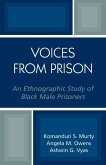Marginalised Voices in Criminology
Herausgeber: Stockdale, Kelly J.; Addison, Michelle
Marginalised Voices in Criminology
Herausgeber: Stockdale, Kelly J.; Addison, Michelle
- Gebundenes Buch
- Merkliste
- Auf die Merkliste
- Bewerten Bewerten
- Teilen
- Produkt teilen
- Produkterinnerung
- Produkterinnerung
This edited collection offers chapters from international criminology scholars, activists, and practitioners to bring together a range of perspectives that have been marginalised or excluded from criminological discourse.
Andere Kunden interessierten sich auch für
![Prisoner Voices from Death Row Prisoner Voices from Death Row]() Reena Mary GeorgePrisoner Voices from Death Row176,99 €
Reena Mary GeorgePrisoner Voices from Death Row176,99 €![Critical Voices in Criminology Critical Voices in Criminology]() Critical Voices in Criminology56,99 €
Critical Voices in Criminology56,99 €![Voices of Torture Survivors in Nepal Voices of Torture Survivors in Nepal]() Krishna GiriVoices of Torture Survivors in Nepal36,99 €
Krishna GiriVoices of Torture Survivors in Nepal36,99 €![Voices from Death Row Voices from Death Row]() Bruce JacksonVoices from Death Row23,99 €
Bruce JacksonVoices from Death Row23,99 €![Voices from Prison Voices from Prison]() Komanduri MurtyVoices from Prison72,99 €
Komanduri MurtyVoices from Prison72,99 €![Ex-Combatants' Voices Ex-Combatants' Voices]() Ex-Combatants' Voices139,09 €
Ex-Combatants' Voices139,09 €![Voices from Death Row Voices from Death Row]() Bruce JacksonVoices from Death Row90,99 €
Bruce JacksonVoices from Death Row90,99 €-
-
-
This edited collection offers chapters from international criminology scholars, activists, and practitioners to bring together a range of perspectives that have been marginalised or excluded from criminological discourse.
Produktdetails
- Produktdetails
- Verlag: Routledge
- Seitenzahl: 254
- Erscheinungstermin: 11. März 2024
- Englisch
- Abmessung: 240mm x 161mm x 18mm
- Gewicht: 549g
- ISBN-13: 9781032198101
- ISBN-10: 1032198109
- Artikelnr.: 69431404
- Herstellerkennzeichnung
- Libri GmbH
- Europaallee 1
- 36244 Bad Hersfeld
- gpsr@libri.de
- Verlag: Routledge
- Seitenzahl: 254
- Erscheinungstermin: 11. März 2024
- Englisch
- Abmessung: 240mm x 161mm x 18mm
- Gewicht: 549g
- ISBN-13: 9781032198101
- ISBN-10: 1032198109
- Artikelnr.: 69431404
- Herstellerkennzeichnung
- Libri GmbH
- Europaallee 1
- 36244 Bad Hersfeld
- gpsr@libri.de
Kelly J. Stockdale is a Senior Lecturer in Criminology at Northumbria University. Her main research relates to criminal justice, restorative justice, and people's lived experiences when in contact with criminal justice agencies. She also researches the criminology curriculum focusing on whose voices are marginalised and whose are prioritised in criminology, why it matters, and what we can do about it. Michelle Addison is an Associate Professor at Durham University. Her research is concerned with a key long-term vision of social justice for those facing the greatest social and health disadvantages in society. She is interested in stigma as social harm arising out of and linked to criminalisation, marginalisation and minoritisation, and how this reproduces multiple complex axes of inequality and oppression.
1. Introduction Michelle Addison and Kelly J. Stockdale Part 1:
Criminological Theory and Marginalisation 2.Dis/ableist Criminology:
Applying Disability Theory Within a Criminological Context Stephen J.
Macdonald and Donna Peacock 3.Engaging Indigenous Australian Voices:
Bringing Epistemic Justice to Criminology? Stephen D. Ashe and Debbie
Bargallie 4.Racialized Young Women Amid the Everyday Stigmatization
of the 'Anglo-Negroid' Family in Interwar Britain: A Decolonial
Perspective Esmorie Miller Part 2: Marginalised Voices in Criminology
5.The Intersection of Age, Gender, and Rurality: Re-centring Young
Women's Experiences in Family Violence Discourse, Policy, and
Practice Bianca Johnston, Faith Gordon and Catherine Flynn 6.Irish
Traveller Men: Structural Barriers and Cultural Barriers, and
Reoffending Megan Coghlan 7.Russian Criminology: A Silenced Voice?
Yulia Chistyakova Part 3: Perpetuating Marginalisation 8.The Power of
Listening; An Ethical Responsibility to Understand, Participate and
Collaborate Natalie Rutter 9.Female Researcher Identities in Male
Spaces and Places Claudia Cox, Kerry Ellis-Devitt and Lisa Sugiura
10.Who is 'The Public' When We Talk About Crime? Interpreting and
Framing Public Voices in Criminology Anna Matczak 11.Whose
Criminology? Marginalized Perspectives and Populations Within Student
Production at the Montreal School of Criminology Alexis Marcoux
Rouleau, Ismehen Melouka and Maude Pérusse-Roy 12.Bringing Prison
Abolition from the Margins to the Centre: Utilising Storywork to
Decentre Carceral Logic in Supervision and Beyond Latoya Rule and
Michele Jarldor 13.Final Reflections Kelly J. Stockdale and Michelle
Addison
Criminological Theory and Marginalisation 2.Dis/ableist Criminology:
Applying Disability Theory Within a Criminological Context Stephen J.
Macdonald and Donna Peacock 3.Engaging Indigenous Australian Voices:
Bringing Epistemic Justice to Criminology? Stephen D. Ashe and Debbie
Bargallie 4.Racialized Young Women Amid the Everyday Stigmatization
of the 'Anglo-Negroid' Family in Interwar Britain: A Decolonial
Perspective Esmorie Miller Part 2: Marginalised Voices in Criminology
5.The Intersection of Age, Gender, and Rurality: Re-centring Young
Women's Experiences in Family Violence Discourse, Policy, and
Practice Bianca Johnston, Faith Gordon and Catherine Flynn 6.Irish
Traveller Men: Structural Barriers and Cultural Barriers, and
Reoffending Megan Coghlan 7.Russian Criminology: A Silenced Voice?
Yulia Chistyakova Part 3: Perpetuating Marginalisation 8.The Power of
Listening; An Ethical Responsibility to Understand, Participate and
Collaborate Natalie Rutter 9.Female Researcher Identities in Male
Spaces and Places Claudia Cox, Kerry Ellis-Devitt and Lisa Sugiura
10.Who is 'The Public' When We Talk About Crime? Interpreting and
Framing Public Voices in Criminology Anna Matczak 11.Whose
Criminology? Marginalized Perspectives and Populations Within Student
Production at the Montreal School of Criminology Alexis Marcoux
Rouleau, Ismehen Melouka and Maude Pérusse-Roy 12.Bringing Prison
Abolition from the Margins to the Centre: Utilising Storywork to
Decentre Carceral Logic in Supervision and Beyond Latoya Rule and
Michele Jarldor 13.Final Reflections Kelly J. Stockdale and Michelle
Addison
1. Introduction Michelle Addison and Kelly J. Stockdale Part 1:
Criminological Theory and Marginalisation 2.Dis/ableist Criminology:
Applying Disability Theory Within a Criminological Context Stephen J.
Macdonald and Donna Peacock 3.Engaging Indigenous Australian Voices:
Bringing Epistemic Justice to Criminology? Stephen D. Ashe and Debbie
Bargallie 4.Racialized Young Women Amid the Everyday Stigmatization
of the 'Anglo-Negroid' Family in Interwar Britain: A Decolonial
Perspective Esmorie Miller Part 2: Marginalised Voices in Criminology
5.The Intersection of Age, Gender, and Rurality: Re-centring Young
Women's Experiences in Family Violence Discourse, Policy, and
Practice Bianca Johnston, Faith Gordon and Catherine Flynn 6.Irish
Traveller Men: Structural Barriers and Cultural Barriers, and
Reoffending Megan Coghlan 7.Russian Criminology: A Silenced Voice?
Yulia Chistyakova Part 3: Perpetuating Marginalisation 8.The Power of
Listening; An Ethical Responsibility to Understand, Participate and
Collaborate Natalie Rutter 9.Female Researcher Identities in Male
Spaces and Places Claudia Cox, Kerry Ellis-Devitt and Lisa Sugiura
10.Who is 'The Public' When We Talk About Crime? Interpreting and
Framing Public Voices in Criminology Anna Matczak 11.Whose
Criminology? Marginalized Perspectives and Populations Within Student
Production at the Montreal School of Criminology Alexis Marcoux
Rouleau, Ismehen Melouka and Maude Pérusse-Roy 12.Bringing Prison
Abolition from the Margins to the Centre: Utilising Storywork to
Decentre Carceral Logic in Supervision and Beyond Latoya Rule and
Michele Jarldor 13.Final Reflections Kelly J. Stockdale and Michelle
Addison
Criminological Theory and Marginalisation 2.Dis/ableist Criminology:
Applying Disability Theory Within a Criminological Context Stephen J.
Macdonald and Donna Peacock 3.Engaging Indigenous Australian Voices:
Bringing Epistemic Justice to Criminology? Stephen D. Ashe and Debbie
Bargallie 4.Racialized Young Women Amid the Everyday Stigmatization
of the 'Anglo-Negroid' Family in Interwar Britain: A Decolonial
Perspective Esmorie Miller Part 2: Marginalised Voices in Criminology
5.The Intersection of Age, Gender, and Rurality: Re-centring Young
Women's Experiences in Family Violence Discourse, Policy, and
Practice Bianca Johnston, Faith Gordon and Catherine Flynn 6.Irish
Traveller Men: Structural Barriers and Cultural Barriers, and
Reoffending Megan Coghlan 7.Russian Criminology: A Silenced Voice?
Yulia Chistyakova Part 3: Perpetuating Marginalisation 8.The Power of
Listening; An Ethical Responsibility to Understand, Participate and
Collaborate Natalie Rutter 9.Female Researcher Identities in Male
Spaces and Places Claudia Cox, Kerry Ellis-Devitt and Lisa Sugiura
10.Who is 'The Public' When We Talk About Crime? Interpreting and
Framing Public Voices in Criminology Anna Matczak 11.Whose
Criminology? Marginalized Perspectives and Populations Within Student
Production at the Montreal School of Criminology Alexis Marcoux
Rouleau, Ismehen Melouka and Maude Pérusse-Roy 12.Bringing Prison
Abolition from the Margins to the Centre: Utilising Storywork to
Decentre Carceral Logic in Supervision and Beyond Latoya Rule and
Michele Jarldor 13.Final Reflections Kelly J. Stockdale and Michelle
Addison









